Rob Mclennan's Blog, page 73
October 31, 2023
Noelle Kocot, Ascent of the Mothers
MIGRANE
Two of every naked animal—
Sheets of water,
Stuck nests and lawns,
Your animated face in myhands,
Studded with cigarettes
And then someonerecognized us.
Two of every animal
Inside my head.
 Theninth full-length collection by Noelle Kocot, current poet laureate of Pemberton Borough, New Jersey, is
Ascent of the Mothers
(Seattle/NewYork: Wave Books, 2023), a sleek collection of some forty pages of precise,halting and deeply specific lyrics. The thinking space between Kocot’s carvedlines are enormous, providing lines and phrases that nearly hover in space. “Let’sbe God / For a moment,” the poem “DIVINATION” begins, “Shall we? / That whichinvites // Composition, / That which is suspended // From a great height, / Thepresence // Of approximation [.]” Kocot’s lines, at times, feel akin to theEnglish-language ghazal, offering leaps from point to point across a greatdistance, nearly drawing a line around what is there but neither seen norspoken, but somehow articulated. “The scope of this book,” as the press releaseoffers, “is marked by a near-fatal car crash, which elicited a newunderstanding of their spirituality and gender nonconforming identity.” Kocot’slyrics extend across lengthy threads of narrative, even through such smallmoments of wise and stunning attention, as the threads across these delicate,fierce poems push and push further. One might say that the scope of these poemsare enormous, with poems touching on considerations of spirituality and the divine,physical being and becoming, and of living precisely within each moment. “Theintractable landscape,” they write, to open “POEM FOR MY GODDAUGHTER HANNAH,” “theharsh sun / On our faces. Waves of we’re alive. Whatever // Happens to me.”
Theninth full-length collection by Noelle Kocot, current poet laureate of Pemberton Borough, New Jersey, is
Ascent of the Mothers
(Seattle/NewYork: Wave Books, 2023), a sleek collection of some forty pages of precise,halting and deeply specific lyrics. The thinking space between Kocot’s carvedlines are enormous, providing lines and phrases that nearly hover in space. “Let’sbe God / For a moment,” the poem “DIVINATION” begins, “Shall we? / That whichinvites // Composition, / That which is suspended // From a great height, / Thepresence // Of approximation [.]” Kocot’s lines, at times, feel akin to theEnglish-language ghazal, offering leaps from point to point across a greatdistance, nearly drawing a line around what is there but neither seen norspoken, but somehow articulated. “The scope of this book,” as the press releaseoffers, “is marked by a near-fatal car crash, which elicited a newunderstanding of their spirituality and gender nonconforming identity.” Kocot’slyrics extend across lengthy threads of narrative, even through such smallmoments of wise and stunning attention, as the threads across these delicate,fierce poems push and push further. One might say that the scope of these poemsare enormous, with poems touching on considerations of spirituality and the divine,physical being and becoming, and of living precisely within each moment. “Theintractable landscape,” they write, to open “POEM FOR MY GODDAUGHTER HANNAH,” “theharsh sun / On our faces. Waves of we’re alive. Whatever // Happens to me.”October 30, 2023
12 or 20 (second series) questions with Kim Rosenfield
 Kim Rosenfield
isa poet and psychotherapist. She is the author of several books of poetry,including USO: I’ll Be Seeing You from Ugly Duckling Presse(2014). She is the 2023 recipient of the FENCE Ottoline Prize. Her latestbook, Phantom Captain, will be published by FENCE in fall2023. Rosenfield is an originating member of the international artist/writerscollective, Collective Task. Her clinical writing can be found in
Psychoanalytic Dialogues
and Studies in Gender and Sexuality. Shelives and works in Brooklyn, NY.
Kim Rosenfield
isa poet and psychotherapist. She is the author of several books of poetry,including USO: I’ll Be Seeing You from Ugly Duckling Presse(2014). She is the 2023 recipient of the FENCE Ottoline Prize. Her latestbook, Phantom Captain, will be published by FENCE in fall2023. Rosenfield is an originating member of the international artist/writerscollective, Collective Task. Her clinical writing can be found in
Psychoanalytic Dialogues
and Studies in Gender and Sexuality. Shelives and works in Brooklyn, NY.1- How did your first book or chapbook change your life? How does your mostrecent work compare to your previous? How does it feel different?
Myfirst chapbook, SOME OF US (Ouija Madness Press), came out when I was 15 yearsold. It took me from writing alone in myteenage bedroom to having a community and place for my work to be seen and heard. It helped get me to college. It most certainly changed my life. I also though that poetry could change theworld. I don’t think that now. I was newto it all. It was an unprecedented time, the Beyond Baroque 80’s Los Angelespoetry scene.
Overthe years my work has become darker, more complex, less youthfully confidentthan that early work, but I still feel connected to it as a formative templateof everything I continue to think and write about today. Just with more life lived and much moreuncertainty mixed in.
2- How did you come to poetry first, as opposed to, say, fiction or non-fiction?
Icame to poetry alongside fiction and am a lifelong reader of both. I was avoracious reader with a library card and a parent willing to drive me to ourlocal branch. I read everything In addition, I loved language absorbed through cereal boxes,shampoo bottles, magazine ads, t.v. jingles, synagogue prayers, music,arguments, newscasts, my grandparents accents, etc. all were a kind of poetry. The form didn’t much matter so much.
3- How long does it take to start any particular writing project? Does yourwriting initially come quickly, or is it a slow process? Do first drafts appearlooking close to their final shape, or does your work come out of copiousnotes?
Slowly,over months and years, with endless lines in endless note books. Eventually loosely refashioned together like asewing pattern. Then refined and edited and then edited some more, thenfinished in a “final” form even though all my work is just one continuousthread spooling out from book to book.
4- Where does a poem usually begin for you? Are you an author of short piecesthat end up combining into a larger project, or are you working on a"book" from the very beginning?
Seeabove.
5- Are public readings part of or counter to your creative process? Are you thesort of writer who enjoys doing readings?
Ilove giving readings and speaking my work out loud. There’s bodies and voicesand bloodstreams and smells and laughter and coughing fits and rustlings anyawns, and eyes closed and walking out, and street noise, and mic static, etc. which I find so exciting! It’s more and less intimate at the sametime. The work gets changed in acollective listening space. I don’t know how to describe it but somuch happens to the poems in a room when read aloud to others.
6- Do you have any theoretical concerns behind your writing? What kinds ofquestions are you trying to answer with your work? What do you even think thecurrent questions are?
Whatdoes It mean to be human is all I ever think about.
7– What do you see the current role of the writer being in larger culture? Dothey even have one? What do you think the role of the writer should be?
Idon’t really think about this in any significant way.
8- Do you find the process of working with an outside editor difficult oressential (or both)?
Itdepends on who it is but I generally like having another mind in on the work, andbeing in the fortunate position of having someone pay such close attention tomy writing is a gift.
9- What is the best piece of advice you've heard (not necessarily given to youdirectly)?
Don’tlisten to anyone else’s advice
10- What kind of writing routine do you tend to keep, or do you even haveone? How does a typical day (for you) begin?
Idon’t have a routine. I have a demanding job so I write when I haveavailable time and energy. A typical day, however, ALWAYS begins with coffee. Lots of coffee.
11- When your writing gets stalled, where do you turn or return for (for lack ofa better word) inspiration?
Itdepends how stalled and for how long but usually conversations with other poets.
12- What fragrance reminds you of home?
L’HeureBlue and damp kitty litter
13- David W. McFadden once said that books come from books, but are there anyother forms that influence your work, whether nature, music, science or visualart?
Allof the above mentioned + animals + insects
14- What other writers or writings are important for your work, or simply yourlife outside of your work?
Asampling:
Freud,Bion. Klein, Winnicott, LaPlanche, Kristeva, Weil, Iregary, the Barangers,Abraham and Torok, Gail Scott, Leonora Carrington, Virginia Woolf, Jean Rhys,Marguerite Duras, Etel Adnan, Buckminster Fuller, Samuel Becket… I could go onand on
15- What would you like to do that you haven't yet done?
Retire
16- If you could pick any other occupation to attempt, what would it be? Or,alternately, what do you think you would have ended up doing had you not been awriter?
Ilove my work as both a therapist and a poet. There’s nothing else that I would ever do.
17- What made you write, as opposed to doing something else?
I’vealways written and done something else simultaneously.
18- What was the last great book you read? What was the last great film?
Book:The Hearing Trumpet—Leonora Carrington
Film:Meshes of the Afternoon—Maya Deren
19- What are you currently working on?
It’sa surprise! Hint: think “Spanish Inquisition.”
October 29, 2023
Amanda Earl, Beast Body Epic
Feathermarked alongor frost-etched
deep into andbelow. Stalactites
suspended intothe dark and my body.
Am I destroyedor am I armoured?
Was I tough? DidI hang on against
all pronouncements?
 Oneof the frustrations of no longer running a trade literary press is that wewould have easily produced one or two further titles by Ottawa poet Amanda Earlbeyond her full-length debut, Kiki (Ottawa ON: Chaudiere Books, 2014),so it was a delight to see her self-produce her latest, the book-length Beast Body Epic (Ottawa ON: AngelHousePress, 2023) [launching online on November 12]. Beast Body Epicdirectly responds to the author’s health crisis from a few years back, and theongoingness of Earl’s expansive lyric and visual structure echoes, slightly, ofhow Dennis Cooley responded to a burst appendix, through his departures (WinnipegMB: Turnstone Press, 2016) [see my review of such here]. As Vancouver poet andeditor Elee Kraljii Gardiner writes as part of her introduction to BeastBody Epic: “She leans into visual poetry, the epic, allusion, disassociation,memoir, verse, prose, fable, allegory, and other modes in order to tell acomplex story in a surprisingly succinct work. The variation is not onlynecessary, it’s seamless, and Amanda’s text flows with the protagonistthrough crisis into stasis and onward.” Gardiner is an interesting choice towrite an introduction, as she knows full well about experiencing a medical crisisand exploring the same through lyric: her collection
Trauma Head
(VancouverBC: Anvil Press, 2018) [see my review of such here] is “a book of poetry about [herexperience with and after] an arterial dissection and stroke [.]”
Oneof the frustrations of no longer running a trade literary press is that wewould have easily produced one or two further titles by Ottawa poet Amanda Earlbeyond her full-length debut, Kiki (Ottawa ON: Chaudiere Books, 2014),so it was a delight to see her self-produce her latest, the book-length Beast Body Epic (Ottawa ON: AngelHousePress, 2023) [launching online on November 12]. Beast Body Epicdirectly responds to the author’s health crisis from a few years back, and theongoingness of Earl’s expansive lyric and visual structure echoes, slightly, ofhow Dennis Cooley responded to a burst appendix, through his departures (WinnipegMB: Turnstone Press, 2016) [see my review of such here]. As Vancouver poet andeditor Elee Kraljii Gardiner writes as part of her introduction to BeastBody Epic: “She leans into visual poetry, the epic, allusion, disassociation,memoir, verse, prose, fable, allegory, and other modes in order to tell acomplex story in a surprisingly succinct work. The variation is not onlynecessary, it’s seamless, and Amanda’s text flows with the protagonistthrough crisis into stasis and onward.” Gardiner is an interesting choice towrite an introduction, as she knows full well about experiencing a medical crisisand exploring the same through lyric: her collection
Trauma Head
(VancouverBC: Anvil Press, 2018) [see my review of such here] is “a book of poetry about [herexperience with and after] an arterial dissection and stroke [.]”Throughouther book-length epic, Earl offers a dense language of sound and play,traversing visual, prose, lyric experimentation and flourish, occasionallysketching a kind of narrative point-form. “Death spent years as the taker.” shewrites, early on in the collection, “Loaded art into their conversation. / TheRot was too drunk and needy, couldn’t breathe. / She nightmare herself tosleep. / The sun ceased. // The fluttering started and didn’t stop. / First thepigeons, then the crows. / Black wing over black wing. / There’s a wolf inthe labyrinth, / the Rot’s husband told her.” Earl’s lyrics and visuals arewildly performative, capable of incredible grace, flourish, anguish and precision,as required. “A nurse gives me Tylenol 3,” she writes, mid-way through thecollection, “a gown / and long white compression socks. / I feel like Anne ofGreen Gables or / maybe Raggedy Anne, my body / stuffed full of rags, myclothes too / big for me, a little orphan girl without / parents or anyone tosave her.” This is a collection that somehow manages to fly in multiple, evencontradictory structural directions simultaneously, while holding together as aclear book-length work with a narrative through-line. If you haven’t beenpaying attention to the ongoing work of Amanda Earl [see my review of her stunning Judith: Women Making Visual Poetry anthology here], you clearly need to begin.
October 28, 2023
Samantha Nock, A Family of Dreamers
fort st. john,
i remember when thereused to be nothing
but flat fields in frontof my elementary school.
behind kokum’s house,
i play pretend in thebackyard.
climb on the railing ofthe porch and talk to
the ravens.
ki miyokîsikan’sin, babe?
 Thefull-length debut from Vancouver-based Samantha Nock is
A Family of Dreamers
(Vancouver BC: Talonbooks, 2023), a collection of first-person lyrics thatexist as an assemblage of monologues or gestures around a landscape of family,ancestors and the land itself, writing her origins in rural north-east BritishColumbia. “we carry the grief of our ancestors.” she writes, to open the poem “followyour traplines home,” “while we carry / our mothers’ grief / our aunties’ grief/ and the grief of the old woman / we saw in shoppers.” Nock’s poems sit aselegies and acknowledgments, offering presence and prayer, writing of mothersand grandmothers and even herself with enormous care. Nock’s poems offer linkagesto the past, and the growing pains of finding herself amid these complexitiesof a living history, as well as northern British Columbia dive bars, “northerncuzzins” and anti-Indigenous racism. This is a deeply intimate collection thatseeks to find and hold one’s place, both as an individual and within a contextfar larger and longer than herself. “hold the braid like this,” she writes, toopen the poem “ceremony,” “here, use this to light it. // we’re not supposed touse a lighter? / shit, just use it anyways. / is it going? // okay. // you rubyour hands together like this? / push the smoke down your body.”
Thefull-length debut from Vancouver-based Samantha Nock is
A Family of Dreamers
(Vancouver BC: Talonbooks, 2023), a collection of first-person lyrics thatexist as an assemblage of monologues or gestures around a landscape of family,ancestors and the land itself, writing her origins in rural north-east BritishColumbia. “we carry the grief of our ancestors.” she writes, to open the poem “followyour traplines home,” “while we carry / our mothers’ grief / our aunties’ grief/ and the grief of the old woman / we saw in shoppers.” Nock’s poems sit aselegies and acknowledgments, offering presence and prayer, writing of mothersand grandmothers and even herself with enormous care. Nock’s poems offer linkagesto the past, and the growing pains of finding herself amid these complexitiesof a living history, as well as northern British Columbia dive bars, “northerncuzzins” and anti-Indigenous racism. This is a deeply intimate collection thatseeks to find and hold one’s place, both as an individual and within a contextfar larger and longer than herself. “hold the braid like this,” she writes, toopen the poem “ceremony,” “here, use this to light it. // we’re not supposed touse a lighter? / shit, just use it anyways. / is it going? // okay. // you rubyour hands together like this? / push the smoke down your body.”
October 27, 2023
Jim Johnstone, The King of Terrors
KRAKEN
Slip of the tongue, slipof the sea’s
eight arms, and the whirlpoolbegins
to compress its armour:
failed spears, failedreel, a lens
to enlarge the pericardialinferno
thrashing like an ocean
of downturned blades; andthe criss-
crossing above, far fromthe eroding
waves mapping the shore,a swell
of limbs reaches out toswallow
all that ruptures thesurface
with the self-same inkand afterglow
that drew Montfort to mime
the wine-dark whine ofthe unseen.
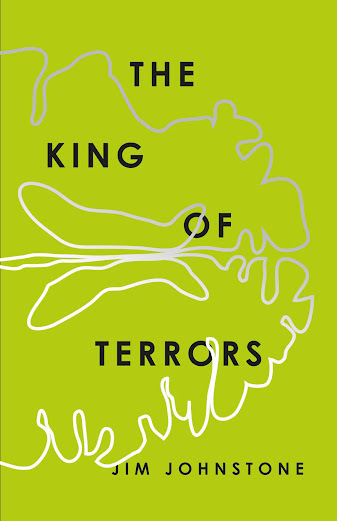 I’mslowly working my way through Toronto poet Jim Johnstone’s seventh full-lengthpoetry title,
The King of Terrors
(Toronto ON: Coach House Books, 2023),following
Infinity Network
(Signal Editions/Vehicule Press, 2022) [see my review of such here], and this new collection is composed “after a braintumour diagnosis,” as the back cover informs, as “a treatise on living withillness and the way that language, relationships, and our immersion in thenatural world can free us from the spectre of impending collapse.” Despite the unexpectedand sudden diagnosis, the poems themselves continue a trajectory of approachfrom his prior collection, offering a wistful and examining commentary on theviolence that exists just below the surface of the skin, whether through largerculture, or quite literally. “From the foot of the bed / only those mistakenfor a storm can stay: // those dreaming / the cyclone’s whip,” he writes, toopen the poem “HAUNTOLOGY.” He writes of impending collapse, even as he writesfrom the perspective of someone deeply grateful, even surprised, to still behere, and his poems offer both a perspective on the immediate moment and thepossibility, and the dread, of that further horizon. “I’m not scared. I’veheard / talk of my condition before – / the times my father would say / it’snot brain surgery, son, / meaning this isn’t life or death / and you haveheard before / you’ll count backwards / from thirty,” he writes, to open the fifthpoem in the eight-poem sequence “THERE IS NOTHING MORE INVASIVE THAN SNOW,” “fightbut fall under / the spell [headache] of sleep, / snow’s all-encompassing /grip.”
I’mslowly working my way through Toronto poet Jim Johnstone’s seventh full-lengthpoetry title,
The King of Terrors
(Toronto ON: Coach House Books, 2023),following
Infinity Network
(Signal Editions/Vehicule Press, 2022) [see my review of such here], and this new collection is composed “after a braintumour diagnosis,” as the back cover informs, as “a treatise on living withillness and the way that language, relationships, and our immersion in thenatural world can free us from the spectre of impending collapse.” Despite the unexpectedand sudden diagnosis, the poems themselves continue a trajectory of approachfrom his prior collection, offering a wistful and examining commentary on theviolence that exists just below the surface of the skin, whether through largerculture, or quite literally. “From the foot of the bed / only those mistakenfor a storm can stay: // those dreaming / the cyclone’s whip,” he writes, toopen the poem “HAUNTOLOGY.” He writes of impending collapse, even as he writesfrom the perspective of someone deeply grateful, even surprised, to still behere, and his poems offer both a perspective on the immediate moment and thepossibility, and the dread, of that further horizon. “I’m not scared. I’veheard / talk of my condition before – / the times my father would say / it’snot brain surgery, son, / meaning this isn’t life or death / and you haveheard before / you’ll count backwards / from thirty,” he writes, to open the fifthpoem in the eight-poem sequence “THERE IS NOTHING MORE INVASIVE THAN SNOW,” “fightbut fall under / the spell [headache] of sleep, / snow’s all-encompassing /grip.”Thereis something very precise in the lyrics of Jim Johnstone, akin to sketchworks:sketched for the sake of quick study, but one with the precision of SylviaLegris [see my review of her latest here] or Da Vinci, sketching withexploratory purpose, and the simultaneous ability to capture and reveal. “Iknow better.” he writes, to close the third poem in the five-poem sequence “WILLWORK FOR BLOOD,” “To cure the ‘insane,’ / settlers built a factory with a clear/ view of the lake – public gardens / fixed in place, fossils framing / thebiosphere. The break in the brick / the only thing that keeps us here.”
October 26, 2023
12 or 20 (second series) questions with Mela Blust
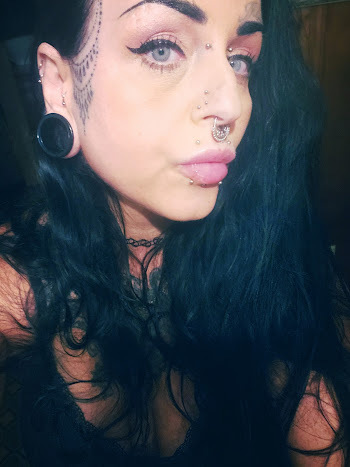 Mela Blust
is a moonchild, and has always had an affinity for the darkness. She is a trauma survivor, an artist, a mother, a wife, a daughter, an avid gardener, and blooming into so much more. She has been writing poetry since she was seven years old.
Mela Blust
is a moonchild, and has always had an affinity for the darkness. She is a trauma survivor, an artist, a mother, a wife, a daughter, an avid gardener, and blooming into so much more. She has been writing poetry since she was seven years old.1 - How did your first book change your life? How does your most recent work compare to your previous? How does it feel different? My first book, Skeleton Parade , opened the door to that closet where the skeletons were hiding. It was the starting point, shining a dusty flashlight on the possibility of my healing. My current work, Men and Their Flowers , is very much a clear offshoot of that healing path, an exploration of self growth and self love after accepting all of the darkness.
2 - How did you come to poetry first, as opposed to, say, fiction or non-fiction? Poetry came to me. I started writing when I was a child. Poetry is my oldest friend.
3 - How long does it take to start any particular writing project? Does your writing initially come quickly, or is it a slow process? Do first drafts appear looking close to their final shape, or does your work come out of copious notes? I tend to write fragments, collect thoughts that arrive in dreams, and ponder imagery. The poetry comes as a manifestation of those pieces.
4 - Where does a poem usually begin for you? Are you an author of short pieces that end up combining into a larger project, or are you working on a "book" from the very beginning? I just write, sporadically and unorganized, collecting and cherishing until a bigger picture eventually appears. When a book is ready, it makes itself known.
5 - Are public readings part of or counter to your creative process? Are you the sort of writer who enjoys doing readings? I love doing readings! It is a fairly new practice for me, but I am hoping to start reading live more often.
6 - Do you have any theoretical concerns behind your writing? What kinds of questions are you trying to answer with your work? What do you even think the current questions are? My writing is very personal and deeply cathartic. However, as a result of my lives experience, I do think my work tends to err on the side of humanist, compassionate.
7 – What do you see the current role of the writer being in larger culture? Do they even have one? What do you think the role of the writer should be? I write for myself. If I affect others, that is a gift to me. I am not a profoundly political poet. There are definitely important roles in society for writers, but I don't tend to think of myself as qualified for those roles.
8 - Do you find the process of working with an outside editor difficult or essential (or both)? Definitely both! I think we need to accept other pairs of eyes, other opinions, as a catalyst for growth, both as a writer and as a human. That isn't to say that editing doesn't come without its own challenges.
9 - What is the best piece of advice you've heard (not necessarily given to you directly)? It doesn't directly deal with writing, but it does relate to life, which as a broader topic includes writing and literally everything else. A friend of mine said he learned that it's important to remember that if you look around at where you're at or who you're with, and it doesn't feel good, the problem isn't you - you're in the wrong place, with the wrong people. That has affected my life and my path so profoundly.
10 - What kind of writing routine do you tend to keep, or do you even have one? How does a typical day (for you) begin? I have no routine whatsoever. I let poetry come through me in whatever way it needs to. After multiple award nominations and books written, clearly it knows what it's doing better than I do.
11 - When your writing gets stalled, where do you turn or return for (for lack of a better word) inspiration? Imagery, stunning, dark, ethereal art, and nature.
12 - What fragrance reminds you of home? Dried eucalyptus.Forever.
13 - David W. McFadden once said that books come from books, but are there any other forms that influence your work, whether nature, music, science or visual art? Heavily, art, music, and nature.
14 - What other writers or writings are important for your work, or simply your life outside of your work? Too many to name. I need and absorb books and poetry like I need water.
15 - What would you like to do that you haven't yet done? Everything that catches my fancy, maybe even things that haven't been thought of yet. I am a thrill seeker, a lover, a passionate liver.
16 - If you could pick any other occupation to attempt, what would it be? Or, alternately, what do you think you would have ended up doing had you not been a writer? I am doing it. I am a profession touch practitioner. I hold people for a living.
17 - What made you write, as opposed to doing something else? I never had a choice. There were times I was frustrated with writing and turned away from it for a while, but it always comes back. It will not be ignored.
18 - What was the last great book you read? What was the last great film? Nothing else could ever compare to Milan Kundera's The Unbearable Lightness of Being . But I also enjoyed his book, A Farewell Waltz . Kundera has this profound way of juxtaposing the stunning beauty and the desperate pain of life and love. Always hits me right in the feels.
19 - What are you currently working on? Currently working on a secret method of dreaming dark, cathartic, witchy, lusty poetry through image meditation before sleep.
12 or 20 (second series) questions;
October 25, 2023
“In Winnipeg / I'll eat your leg.” — Dennis Lee
 Youknow that poem, don’t you? From Dennis Lee’s classic Alligator Pie (TorontoON: Macmillan, 1974). If you don’t have a copy, you should certainly get one. Idoubt the book has been out of print since it originally appeared. Over theweekend, I made my way to Winnipeg for a quick overnight to launch my latest poetry collection, World’s End, (2023), a collection that immediately pre-dates my University of Calgary title,
the book of smaller
(2022). The publisher, ARP Books, had set up agroup launch for a trio of their recent poetry titles, including Ottawa poet natalie hanna’slisan al’asfour (2022) [see my review of such here] and Vancouver poet NinaMosall’s Bebakhshid (2023), both of which mark their full-length debuts.
Youknow that poem, don’t you? From Dennis Lee’s classic Alligator Pie (TorontoON: Macmillan, 1974). If you don’t have a copy, you should certainly get one. Idoubt the book has been out of print since it originally appeared. Over theweekend, I made my way to Winnipeg for a quick overnight to launch my latest poetry collection, World’s End, (2023), a collection that immediately pre-dates my University of Calgary title,
the book of smaller
(2022). The publisher, ARP Books, had set up agroup launch for a trio of their recent poetry titles, including Ottawa poet natalie hanna’slisan al’asfour (2022) [see my review of such here] and Vancouver poet NinaMosall’s Bebakhshid (2023), both of which mark their full-length debuts.
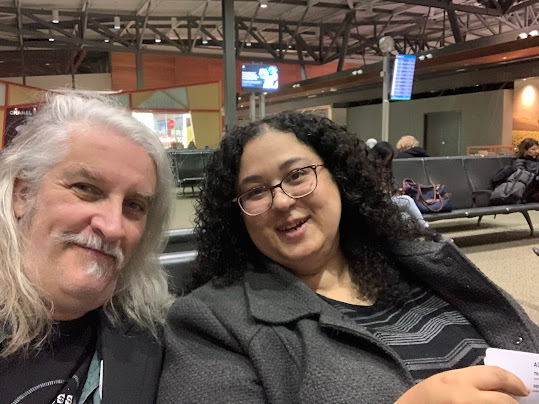 Oh,Winnipeg. It has been a while since I’ve been this way. The prior weekend I wasat a festival in Corner Brook, Newfoundland [see my report on such here]. InDecember, I launched my Mansfield Press pandemic essay collection in Torontowith Stephen Brockwell and Amy Dennis, etc [see my report on such here] andanother Toronto reading last July through Larry Sawyer/milk magazine [see my report here]. Remember all those? Before that, nothing back to February 2020, when Christine and I readin Vancouver as part of Lunch Poems at SFU [see my report on such here]. Did I everdo a report on my prior reading in Winnipeg? Going back through my posts, itdoes look like I toured a full thirty days back in 2006, posting all sorts of travelnonsense during that time [landing in Winnipeg; being in Winnipeg; leaving Winnipeg]. Has it really been that long since I read there? I know I’ve been atleast once since to meet up with some of Christine’s aunties and Oma. Either way, I thinkmy notes make more sense now.
Oh,Winnipeg. It has been a while since I’ve been this way. The prior weekend I wasat a festival in Corner Brook, Newfoundland [see my report on such here]. InDecember, I launched my Mansfield Press pandemic essay collection in Torontowith Stephen Brockwell and Amy Dennis, etc [see my report on such here] andanother Toronto reading last July through Larry Sawyer/milk magazine [see my report here]. Remember all those? Before that, nothing back to February 2020, when Christine and I readin Vancouver as part of Lunch Poems at SFU [see my report on such here]. Did I everdo a report on my prior reading in Winnipeg? Going back through my posts, itdoes look like I toured a full thirty days back in 2006, posting all sorts of travelnonsense during that time [landing in Winnipeg; being in Winnipeg; leaving Winnipeg]. Has it really been that long since I read there? I know I’ve been atleast once since to meet up with some of Christine’s aunties and Oma. Either way, I thinkmy notes make more sense now.
 natalieand I met at the airport at some ridiculously-early time for our shared flights(a brief stop-over in Toronto), as we shared hazy conversation until boarding(we were seated rather distantly on the flights themselves). I deliberatelybrought no reading material with me to force myself to finish the final editson this forthcoming collection of short stories, On Beauty: stories (Universityof Alberta Press), supposedly scheduled for next fall, if I can complete theseedits in time.
natalieand I met at the airport at some ridiculously-early time for our shared flights(a brief stop-over in Toronto), as we shared hazy conversation until boarding(we were seated rather distantly on the flights themselves). I deliberatelybrought no reading material with me to force myself to finish the final editson this forthcoming collection of short stories, On Beauty: stories (Universityof Alberta Press), supposedly scheduled for next fall, if I can complete theseedits in time.
 Welanded, we made for the hotel, we lunched. We sat for a moment, to breathe. Shecaught her room prior to lunch, mine wasn’t ready until after. Once we werefinished our lunch, she went to crash for a bit and I wandered, ending up at thePlug In Institute of Contemporary Art, an artist run centre almost directlyacross the street from our hotel, where I saw some really interesting shows(that I would completely recommend). Farah Al Qasimi’s work, The Swarm, is quitestunning. Ultimately, I was heading to the big ridiculous Winnipeg sign at TheForks, which led me more than a kilometre of walking (repeatedly asking localsif I was headed the correct way), wandering in, around and through downtown ina zigzag. I caught the Portage Place mall (where I spent many hours writing intheir food court, during prior visits), and saw the march of some hundreds ofpeople protesting Israel’s bombing of Gaza, which is devastating thePalestinian people (everyone needs to stop all the bombing, please). I wandered the corner of Portage and Main for a selfie,none of which captured either sign for proof. I walked through the trainstation, one of the few of those original train stations still functioningacross Canada (Calgary is shuttered; Edmonton and Ottawa stations relocatedyears ago). Once I found it, two tourists from Philadelphia were kind enough tocapture the photo of me at the sign.
Welanded, we made for the hotel, we lunched. We sat for a moment, to breathe. Shecaught her room prior to lunch, mine wasn’t ready until after. Once we werefinished our lunch, she went to crash for a bit and I wandered, ending up at thePlug In Institute of Contemporary Art, an artist run centre almost directlyacross the street from our hotel, where I saw some really interesting shows(that I would completely recommend). Farah Al Qasimi’s work, The Swarm, is quitestunning. Ultimately, I was heading to the big ridiculous Winnipeg sign at TheForks, which led me more than a kilometre of walking (repeatedly asking localsif I was headed the correct way), wandering in, around and through downtown ina zigzag. I caught the Portage Place mall (where I spent many hours writing intheir food court, during prior visits), and saw the march of some hundreds ofpeople protesting Israel’s bombing of Gaza, which is devastating thePalestinian people (everyone needs to stop all the bombing, please). I wandered the corner of Portage and Main for a selfie,none of which captured either sign for proof. I walked through the trainstation, one of the few of those original train stations still functioningacross Canada (Calgary is shuttered; Edmonton and Ottawa stations relocatedyears ago). Once I found it, two tourists from Philadelphia were kind enough tocapture the photo of me at the sign.

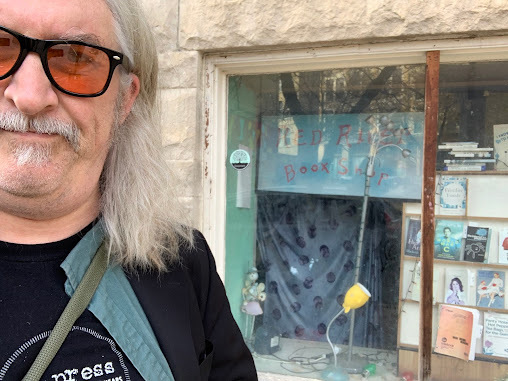 Oncedone, I headed straight back, another kilometre-plus back into the Exchangedistrict for the sake of Red River Books: this is one of my favourite usedbookstores in Canada, and I easily mailed boxes of purchased books home fromthis store across those years of touring from 1997 to 2006. I made the store by4pm, just in time to realize it had already been closed for an hour. What! And beingSaturday, there was no point attempting the ArtSpace building, which housesTurnstone Press,
CV2 magazine
,
Prairie Fire
, The Manitoba Writers Guild, etcetera (I used to spend half a day on each trip wandering thebuilding, visiting). This is when and were I first met Todd Besant, whocurrently runs ARP Books, during his tenure at Turnstone. Instead, I sought outa seat somewhere for the sake of some food, perhaps, and possibly a drink,landing at the Amsterdam Tea Room and Bar. I mean, I needed to be at thereading venue by 5:30pm, and it was only a couple blocks further, so there wasno point in wandering back to the mall for the food court (which I did consider).
Oncedone, I headed straight back, another kilometre-plus back into the Exchangedistrict for the sake of Red River Books: this is one of my favourite usedbookstores in Canada, and I easily mailed boxes of purchased books home fromthis store across those years of touring from 1997 to 2006. I made the store by4pm, just in time to realize it had already been closed for an hour. What! And beingSaturday, there was no point attempting the ArtSpace building, which housesTurnstone Press,
CV2 magazine
,
Prairie Fire
, The Manitoba Writers Guild, etcetera (I used to spend half a day on each trip wandering thebuilding, visiting). This is when and were I first met Todd Besant, whocurrently runs ARP Books, during his tenure at Turnstone. Instead, I sought outa seat somewhere for the sake of some food, perhaps, and possibly a drink,landing at the Amsterdam Tea Room and Bar. I mean, I needed to be at thereading venue by 5:30pm, and it was only a couple blocks further, so there wasno point in wandering back to the mall for the food court (which I did consider).

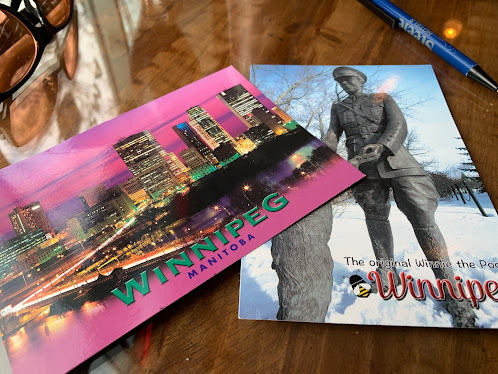 TheAmsterdam was curious: a fancy bar for tea-flavoured cocktails (their menu forsuch was extensive; I ordered a stout, avoiding all of that). While there, I wrotepostcards for the children, only to have a younger couple nearby stunned that Iwas writing postcards. It’s a lost art! he said. Can I take your picturewriting postcards? she asked? Um, I suppose?
TheAmsterdam was curious: a fancy bar for tea-flavoured cocktails (their menu forsuch was extensive; I ordered a stout, avoiding all of that). While there, I wrotepostcards for the children, only to have a younger couple nearby stunned that Iwas writing postcards. It’s a lost art! he said. Can I take your picturewriting postcards? she asked? Um, I suppose?
 And did you see this? En route to the gallery: a building with a restored original front for that whole block, and new back. Completely lovely.
And did you see this? En route to the gallery: a building with a restored original front for that whole block, and new back. Completely lovely.Thereading itself was glorious! It was a small crowd, but quality. I don’t think I’dseen A.J. (Adam) Levin since 2004, when we read together at the WindsorFestival, when I launched my Palimpsest Books title (I still have copies, despite it being out of print). K.I. (Karen) Press lookedno different than she had ever done. Why doesn’t she age? And it was great tofinally meet (in-person) Winnipeg poets Julian Day, melanie brannagan and above/ground press author Melanie Dennis Unrau. Dennis Cooley, as well, was his usual self, his pulse of electrical energyjust there beneath the surface. The benefit, also, of those latter four being above/ground press subscribers, I was able to hand them three envelopes each, which didlighten my load considerably. And did you know cam scott [did you see my review of his latest?] is part of aceart aswell? I hadn’t met him yet, either. Oh, he'sso good. We’ve been discussing doing a chapbook together for some time now.

Christine’stwo maternal aunties were also there! They live in Winnipeg, after all. It waslovely to see them.
Thelast time I was at aceart, Winnipeg’s glorious artist-run centre, it was in adifferent location. For reasons unknown, Sylvia Legris thought I should be partof an art auction they were running back in the fall of 1999, and, given I’drecently won the Canadian Authors Association Air Canada Prize for MostPromising Writer (in any genre) in Canada under 30 (their only non-cash prize,but included two free tickets to anywhere Air Canada flew), I was able to useone of those tickets to fly into Winnipeg for the sake of that auction. I stayedwith Dennis Cooley, brought along terrible artwork and spent the eveningworking the bar at the event. At least when Karen Connelly won the same prize nearlya decade earlier, she used her tickets for a bit more purpose: flying toThailand, where she spent a year composing her Governor General’s Award-winningtravel memoir, Touch the Dragon (Winnipeg MB: Turnstone Press, 1992).
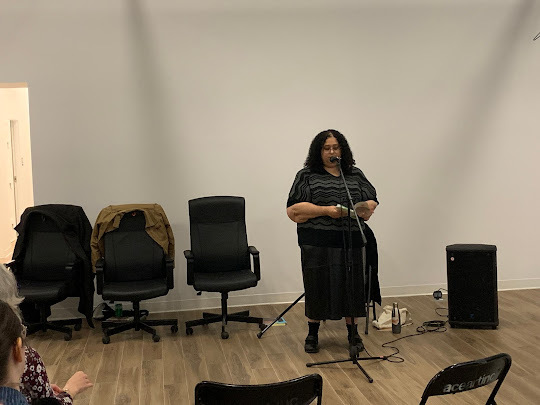 nataliehanna does occupy an interesting space in Ottawa literary circles: despite thisbeing her full-length debut, she’s been active for years (with a break mid-wayfor the sake of law school and articling), even back to the second half of the1990s, when she was involved with running readings at Mother Tongue Books (aseries, if I recall correctly, organized with Stephanie Bolster) and above/groundpress even published a chapbook-length long poem of hers as an issue of thelong poem magazine STANZAS. The reading was straightforward enough (andwe were all amazing, I’ll have you know), but what was intriguing was Andrew Leeprompting a panel conversation between the three of us at the end of the event.He opened with a question, and then asked if we had questions for each other (Ididn’t realize we’d had homework).
nataliehanna does occupy an interesting space in Ottawa literary circles: despite thisbeing her full-length debut, she’s been active for years (with a break mid-wayfor the sake of law school and articling), even back to the second half of the1990s, when she was involved with running readings at Mother Tongue Books (aseries, if I recall correctly, organized with Stephanie Bolster) and above/groundpress even published a chapbook-length long poem of hers as an issue of thelong poem magazine STANZAS. The reading was straightforward enough (andwe were all amazing, I’ll have you know), but what was intriguing was Andrew Leeprompting a panel conversation between the three of us at the end of the event.He opened with a question, and then asked if we had questions for each other (Ididn’t realize we’d had homework). 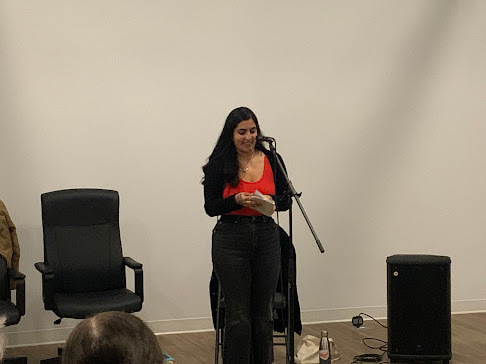 Nina, on her part, immediately jumped at theopportunity, and pulled out a whole list of questions she’d prepared (citingthat, as a librarian, this was something she was quite good at). Her questionswere interesting, although I made a point of prompting her to answer each oneas well, after natalie and I had. After a handful of Nina’s questions, I pointedout that all of her questions seemed to be structural (ie: variations on form, asopposed to questions around content), which prompted me to ask her how herpoems begin. She hadn’t even realized her direction. I feel seen! she said,startled.
Nina, on her part, immediately jumped at theopportunity, and pulled out a whole list of questions she’d prepared (citingthat, as a librarian, this was something she was quite good at). Her questionswere interesting, although I made a point of prompting her to answer each oneas well, after natalie and I had. After a handful of Nina’s questions, I pointedout that all of her questions seemed to be structural (ie: variations on form, asopposed to questions around content), which prompted me to ask her how herpoems begin. She hadn’t even realized her direction. I feel seen! she said,startled.
 K.I. (Karen) Press
K.I. (Karen) Press
Allin all, a very fine event, a very fine trip. Thank you, co-readers, and toeveryone at ARP Books: Todd, Irene (in absentia) and Andrew. Thank you.
 myself reading! photo by Andrew Lee, ARP Books
myself reading! photo by Andrew Lee, ARP BooksOctober 24, 2023
12 or 20 (second series) questions with M.W. Jaeggle
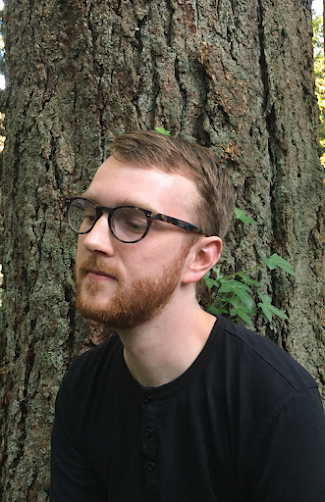
Born inVancouver, British Columbia, M.W. Jaeggle is the author of three chapbooks, Janus on the Pacific, The Night of the Crash, and Choreography for a Falling Blouse. He livesin Buffalo, New York, where he is a PhD student in the Department of English atSUNY Buffalo. Wrack Line is his first book of poetry.
1 -How did your first book or chapbook change your life? How does your most recentwork compare to your previous? How does it feel different?
It feels more accurate to credit Wrack Line with confirming the variousways I experience the world than with precipitating a momentous change. I willcontinue to pay attention to the sensuous qualities of words, continue to placeemotion in service of the natural world, and continue to try to put the workbefore the ego—and I can point to the bookas confirming my sense that these things are pretty good ways of being inthe world.
2 -How did you come to poetry first, as opposed to, say, fiction or non-fiction?
One of the very few benefits of learning toread and write late in childhood is being able to draw upon distinct memoriesof struggling with words. I remember slowly pronouncing a certain word,dragging my thumb across its letters so as not to be overwhelmed by the thingin its entirety. I remember the joys and frustrations of reading those first words,and later of stringing them into sentences of my own. Poetry came first, andcontinues to come first, because my early difficulties with language taught meto be patient and approach words as a tenuous meeting of sound and sense.
3 -How long does it take to start any particular writing project? Does yourwriting initially come quickly, or is it a slow process? Do first drafts appearlooking close to their final shape, or does your work come out of copiousnotes?
I cannot say how long it takes to start a creativeproject because I don’t know when any of mine have really started. I don’t keeptrack of when one idea gives way to another or when the words hit the page. Ittakes some time, that’s all I can say.
4 -Where does a poem usually begin for you? Are you an author of short pieces thatend up combining into a larger project, or are you working on a “book” from thevery beginning?
I don’t typically write a poem with apredetermined sense of how it will fit within a larger project. I try to stayopen for as long as possible.
5 -Are public readings part of or counter to your creative process? Are you thesort of writer who enjoys doing readings?
Reading poetry in front of others is great onthe condition that everyone in attendance is a willing participant. I willnever again read in a pub while the Habs-Leafs game is playing on the TV.
6 -Do you have any theoretical concerns behind your writing? What kinds ofquestions are you trying to answer with your work? What do you even think thecurrent questions are?
In 2016, as part of his commencement speech to graduates of Simon Fraser University and as part of his acceptance of an honorary doctorate from the university, the poet Robert Bringhurst said somethingto the effect that in order for one to respect the earth one had to think likean ecosystem. Think like an ecosystem isthe closest thing I have to a theoretical concern.
7 –What do you see the current role of the writer being in larger culture? Do theyeven have one? What do you think the role of the writer should be?
To make the case for more humane andecologically attentive values than the ones that characterize our neoliberalmoment. To develop words, phrases, and sentences commensurate with our encounterswith the nonhuman world. To exercise a claim on the imaginations of others.
8 -Do you find the process of working with an outside editor difficult oressential (or both)?
It’s absolutely essential to have that outsideperspective. If I have ever faced difficulty during the editing process, it’salways proved worthwhile in retrospect.
9 -What is the best piece of advice you’ve heard (not necessarily given to youdirectly)?
Get some air.
10- What kind of writing routine do you tend to keep, or do you even haveone? How does a typical day (for you) begin?
I don’t have a writing routine. I steal thetime to write from other tasks.
11 -When your writing gets stalled, where do you turn or return for (for lack of abetter word) inspiration?
I go for a walk. I listen to music. I getin touch with friends. I give it some time.
12 -What fragrance reminds you of home?
Smoked salmon.
13 -David W. McFadden once said that books come from books, but are there any otherforms that influence your work, whether nature, music, science or visual art?
Fine art and the natural world influence mywork just as much as books.
14 -What other writers or writings are important for your work, or simply your lifeoutside of your work?
There are too many writers to list here.Most of them belong to an earlier generation.
15 -What would you like to do that you haven’t yet done?
Grow my own vegetables.
16 -If you could pick any other occupation to attempt, what would it be? Or,alternately, what do you think you would have ended up doing had you not been awriter?
A Zen monastic—more of a calling than anoccupation, I suppose.
17 -What made you write, as opposed to doing something else?
It’s portable and low-tech. All you need isa few inexpensive instruments, some solitude, and some time.
18 -What was the last great book you read? What was the last great film?
Hugh MacDiarmid’s A Drunk Man Looks at the Thistle.
Terrence Mallick’s Days of Heaven.
19 -What are you currently working on?
Too many things—all of which resemblepeople in that they don’t like to be talked about when they’re not present.
October 23, 2023
John Yau, Tell It Slant
Chinatown Blues
Don’t keep saying poetrymakes nothing happen
I am not trying to beyour surrogate chaplain
I am going to grow up andbe a hatchet man
Doing the sharp and shinything—being the best I can
Don’t tell me the wood isfar too green or yellow
Or that Mr. Frost—protectorof fences—is a jolly good fellow
I am still going to growup and tell it slant
Don’t even try and tellme I can’t
Stop reminding me I have towatch what I say
Be polite or I will haveto pay and pay
I am still going to growand be a hatchet man
Doing the sharp and shinything—being the very best I can
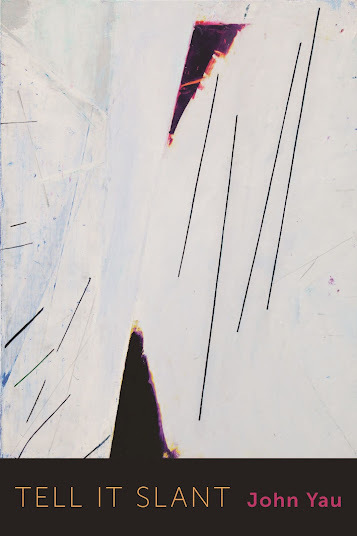 I’menjoying American poet and editor John Yau’s latest collection,
Tell It Slant
(Oakland CA: Omnidawn, 2023), only the second I’ve encountered of hiswide array of myriad titles, following
Genghis Chan on Drums
(Omnidawn,2021) [see my review of such here]. There is such a smart and playful way thatYau twists and twirls expectation and perception, plucking Emily Dickinson’sinfamous line to turn, as the back cover offers, “a racist slur (slanted eyes)into the sign by which we recognize the trustworthy phenomenologist.” Recently Iwas discussing part of an essay by Canadian poet Don McKay that suggested thatstand-up comedy and lyric poetry (which only applies to a particular kind ofstand-up against a particular kind of lyric poem, naturally) are deeplyrelated: how the familiar is offered as set-up, with the alternate, unexpectedand fresh perspective at the end, which becomes the “a-ha” moment of the lyric,and where the joke originates (of course I can’t recall where this sits in McKay’sbooks). “One day I will wake up and my hair turned white / and I am no longerChinese,” Yau writes, to open the poem “Memories of Charles Street, Boston,” “Iwant to ask my mother about this change in my appearance / but she has beendead longer than I have been alive [.]”
I’menjoying American poet and editor John Yau’s latest collection,
Tell It Slant
(Oakland CA: Omnidawn, 2023), only the second I’ve encountered of hiswide array of myriad titles, following
Genghis Chan on Drums
(Omnidawn,2021) [see my review of such here]. There is such a smart and playful way thatYau twists and twirls expectation and perception, plucking Emily Dickinson’sinfamous line to turn, as the back cover offers, “a racist slur (slanted eyes)into the sign by which we recognize the trustworthy phenomenologist.” Recently Iwas discussing part of an essay by Canadian poet Don McKay that suggested thatstand-up comedy and lyric poetry (which only applies to a particular kind ofstand-up against a particular kind of lyric poem, naturally) are deeplyrelated: how the familiar is offered as set-up, with the alternate, unexpectedand fresh perspective at the end, which becomes the “a-ha” moment of the lyric,and where the joke originates (of course I can’t recall where this sits in McKay’sbooks). “One day I will wake up and my hair turned white / and I am no longerChinese,” Yau writes, to open the poem “Memories of Charles Street, Boston,” “Iwant to ask my mother about this change in my appearance / but she has beendead longer than I have been alive [.]” JohnYau cearly delights in reworking perception against the familiar, even while examiningmore serious subject matter. Yau writes through Charles Baudelaire, Thomas DeQuincey, Philip K. Dick, old films, paintings and Wang Wei across an examinationof lyric form and prose structures that shift enormously, from clipped lyricnarratives and point-form stretches, carved diamond shapes, sonnet sequencesand extended essays, all with a level of serious play, invention and flourish. “Tomake every devourer wish life could be written in reverse,” he writes, to closethe first poem in the sequence “Li Shangyin Enters Manhattan,” “Do you knowwhose glossolalia you will be speaking in today [.]” In certain ways, Yau isthe master of the long thread—how to get there from here—holding an ideaslightly turned and seeing it through as far as might be possible. Hisperspectives are turned, ever so slight, but beyond what others might be ableto see, or connect, without the benefit of Yau’s unique sight. Or, as heoffers, as part of the opening of the second poem in the same sequence: “Thegreatest poet in Chinese history / Is a mulberry tree on which poems / Are sprinkledin ash, ink, or snow [.]”
October 22, 2023
Gail Scott, Furniture Music: A Northern in Manhattan: Poets/Politics [2008-2012]
Having hidden. Weeks. Fromblazing streets. Sliding, on this Depression-type day. Off meager patch of sun.On box pattern sheets. In search of tiny autumn rays. Mid shadow-casting highbuildings. Trying scorching dusty bus-stop bench. Moving on to stone wall ofNYU’s Silver Towers quadrant. Trying to read Stein. On governance + identity.Under stone-cold eye of huge flirty Picasso Sylvette sculpture. Ifthere was no identity no one could be governed, but everybody is governed byeverybody and that is why they make no master-pieces. Moving again for sun.To business school square. Suits milling chaotically. Notwithstanding bankbailouts. To calm the disaster. Late-afternoon vagabonds. Relaxing on benches.One stretched out on left side. Facing bench back. Pees, Piss’s meandering downslight incline of square. Till running between legs of your chair.
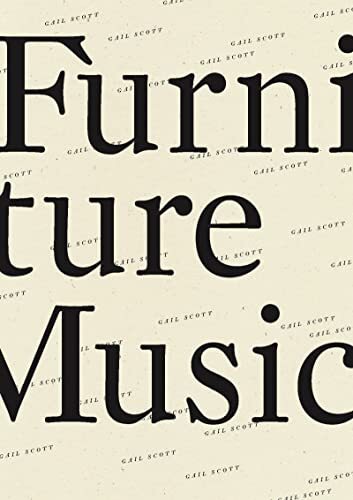 I’mfascinated by Montreal writer Gail Scott’s latest, Furniture Music: A Northern in Manhattan: Poets/Politics [2008-2012] (Seattle/New York: Wave Books,2023), a prose lyric memoir from a particular period that the author lived inNew York City. Scott offers a portrait of this stretch of history as it occurs,interweaving, layering and overlapping commentary, events, lines from otherwriters (a combination of Scott’s own reading, attending readings and further in-personinteractions), politics (the newly-minted President Barack Obama, for example,as counterpoint to our then-Conservative Prime Minister), language, translationand multiple other threads, interwoven across a text akin to the journal-lyricsof the (since) late New York School poet Bernadette Mayer. Scott seeks, as sheoffers at one point, a new way of thinking about prose through interacting withexperimental poetry and experimental poets. “Too bad poetic language making peoplenervous. Are not prose’s suppositions, comparisions, descripts, more clarifying?”At one point, Scott even attends a group reading of Mayer’s classic collection
Midwinter Day
(Turtle Island Foundation, 1982; New Directions, 1999), although thereare elements of Scott’s prose that share just as many elements with Mayer’s 1970s-eracollaborative
Piece of Cake
(with Lewis Warsh; Station Hill Press, 2020)[see my review of such here]. Moving from point to point to point, Scott composesa through-line structured around a myriad of voices, slang, quoted material andlocal activities. “Days progressing direct—>departure.” she writes,mid-way through. “At same time. Time feeling stopped. As in stagnant flat greyclouds. Over water towards atop buildings. Thermometer also stuck. Well above freezing.You. In some kind of trance. Processing return North. Meandering, into coconut-creamParish Hall. For seminal 70s Midwinter Day 30th anniversarygroup reading. In homage to BM’s cold crisp bright December. [The kindyou liking.] Which 120-page beauty. Said penned in 24 hours.”
I’mfascinated by Montreal writer Gail Scott’s latest, Furniture Music: A Northern in Manhattan: Poets/Politics [2008-2012] (Seattle/New York: Wave Books,2023), a prose lyric memoir from a particular period that the author lived inNew York City. Scott offers a portrait of this stretch of history as it occurs,interweaving, layering and overlapping commentary, events, lines from otherwriters (a combination of Scott’s own reading, attending readings and further in-personinteractions), politics (the newly-minted President Barack Obama, for example,as counterpoint to our then-Conservative Prime Minister), language, translationand multiple other threads, interwoven across a text akin to the journal-lyricsof the (since) late New York School poet Bernadette Mayer. Scott seeks, as sheoffers at one point, a new way of thinking about prose through interacting withexperimental poetry and experimental poets. “Too bad poetic language making peoplenervous. Are not prose’s suppositions, comparisions, descripts, more clarifying?”At one point, Scott even attends a group reading of Mayer’s classic collection
Midwinter Day
(Turtle Island Foundation, 1982; New Directions, 1999), although thereare elements of Scott’s prose that share just as many elements with Mayer’s 1970s-eracollaborative
Piece of Cake
(with Lewis Warsh; Station Hill Press, 2020)[see my review of such here]. Moving from point to point to point, Scott composesa through-line structured around a myriad of voices, slang, quoted material andlocal activities. “Days progressing direct—>departure.” she writes,mid-way through. “At same time. Time feeling stopped. As in stagnant flat greyclouds. Over water towards atop buildings. Thermometer also stuck. Well above freezing.You. In some kind of trance. Processing return North. Meandering, into coconut-creamParish Hall. For seminal 70s Midwinter Day 30th anniversarygroup reading. In homage to BM’s cold crisp bright December. [The kindyou liking.] Which 120-page beauty. Said penned in 24 hours.”[Here, Furniture Music. Inback of head. Striking up refrain. Ostinato. Of North country’s tragichistoric divide. As group of youthful First Nations. Fastest growing Canadianyouth demographic. Setting out fromJames Bay on snowshoes. Headed for Parliament. We are losing our territories, withoutthem we are nothing. Walking for days. In up to -40C weather. Joined byhundreds more. Bearing gifts for Conservative Canadian Prime Minister: Pair ofbeautifully crafted snowshoes. But where is Mr. Harper on day they arriving inOttawa capital? In another city welcoming pair of pandas. Flown in from China. They’revery wiggly, he giggles.]
Thereis an element of Scott’s interweavings, as a Canadian writer in New Yorkseeking to understand the landscape of city, writing and writers from groundlevel reminiscent, slightly, of that early blend of essay and memoir by Ottawa writer Elizabeth Hay, Captivity Tales: Canadians in New York (New StarBooks, 1993); whereas Hay looked to the past, and connections between New Yorkand Canada, Scott deliberately embraces her immediate present, a perspectiveupon the surrounding community of writers, artists and thinkers from a Canadianperspective. As Scott offers, early on: “Any account of another country isan account of one left behind. Satie called background music Furniture Music.Trotting of Bowery, under Obama campaign portrait-posters.”
Scottworks a first-person staccato into a magnificent, lively and immediate prose-tapestry,a bounce across sound and syntax nearly a prose-equivalent (simultaneously morereadable and more complex) of the electric and punctuated gestures of the poetryof Canadian ex-pat Adeena Karasick. “Probably overstating how writing inEnglish in Francophone Québec.” she writes, early on in the collection. “Impacting[as per Gertrude Stein in Paris] sentencing. For one, French syntax/cadenceenhancing lingual gesturality. In local English. Given French sentencing’stendency to be axed on the verb. While English sentencing classically moredescriptive. More oriented toward object end of phrasing. Knowing on very thinice.”



